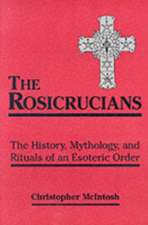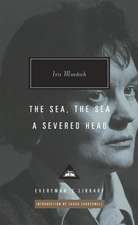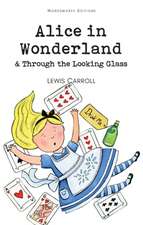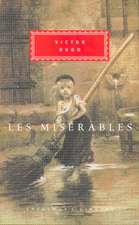Frankenstein: Changing Our World
Autor Mary Wollstonecraft Shelley Diane Johnsonen Limba Engleză Paperback – 31 ian 2002 – vârsta de la 12 până la 18 ani
Written in 1816 when she was only nineteen, Mary Shelley's novel of "The Modern Prometheus" chillingly dramatized the dangerous potential of life begotten upon a laboratory table. A frightening creation myth for our own time, Frankenstein remains one of the greatest horror stories ever written and is an undisputed classic of its kind.
Preț: 38.94 lei
Nou
Puncte Express: 58
Preț estimativ în valută:
7.45€ • 7.80$ • 6.19£
7.45€ • 7.80$ • 6.19£
Carte disponibilă
Livrare economică 12-26 martie
Preluare comenzi: 021 569.72.76
Specificații
ISBN-13: 9780553212471
ISBN-10: 0553212478
Pagini: 256
Dimensiuni: 117 x 177 x 15 mm
Greutate: 0.13 kg
Ediția:Bantan Classic.
Editura: Bantam Classics
Seria Changing Our World
ISBN-10: 0553212478
Pagini: 256
Dimensiuni: 117 x 177 x 15 mm
Greutate: 0.13 kg
Ediția:Bantan Classic.
Editura: Bantam Classics
Seria Changing Our World
Notă biografică
The daughter of Mary Wollestonecraft, the ardent feminist and author of A Vindication on the Right of Women, and William Goodwin, the Radical-anarchist philosopher and author of Lives of the Necromancers, Mary Goodwin was born into a freethinking, revolutionary household in London on August 30,1797. Educated mainly by her intellectual surroundings, she had little formal schooling and at sixteen eloped with the young poet Percy Bysshe Shelly; they eventually married in 1816.
Mary Shelly’s life had many tragic elements. Her mother died giving birth to Mary; her half-sister committed suicide; Harriet Shelly–Percy’s wife dr5owned heself and her unborn child after he ran off with Mary’ William Goodwin disowned Mary and Shelly after the elopement, but–heavily in debt–recanted and came to them for money; Mary’s first child died soon after its birth; and in 1822 Percy Shelly drowned in the Gulf of La Spezia–when Mary was not quite twenty-five.
Mary Shelly recalled that her husband was “forever inciting” her to “obtain literary reputation.” But she did not begin to write seriously until the summer of 1816, when she and Shelly we in Switzerland, neighbor to Lord Byron. One night following a contest to compose ghost stories, Mary conceived her masterpeicve. Frankenstein. After Shelly’s death she continued to write Valperga (1823), The Last Man (1826), Ladore (1835), and Faulkner (1837), in addition to editing he husband’s works. In 1838 she began to work on his biography, but owing to poor health she completed only a fragment.
Although she received marriage proposals from Trelawney, John Howard Payne, and perhaps Washington Irving, Mary Shelly never remarried. “I want to be Mary Shelly on my tombstone,” she is reported to have said. She died on February 1, 1851, survived by he son, Percy Florence.
Mary Shelly’s life had many tragic elements. Her mother died giving birth to Mary; her half-sister committed suicide; Harriet Shelly–Percy’s wife dr5owned heself and her unborn child after he ran off with Mary’ William Goodwin disowned Mary and Shelly after the elopement, but–heavily in debt–recanted and came to them for money; Mary’s first child died soon after its birth; and in 1822 Percy Shelly drowned in the Gulf of La Spezia–when Mary was not quite twenty-five.
Mary Shelly recalled that her husband was “forever inciting” her to “obtain literary reputation.” But she did not begin to write seriously until the summer of 1816, when she and Shelly we in Switzerland, neighbor to Lord Byron. One night following a contest to compose ghost stories, Mary conceived her masterpeicve. Frankenstein. After Shelly’s death she continued to write Valperga (1823), The Last Man (1826), Ladore (1835), and Faulkner (1837), in addition to editing he husband’s works. In 1838 she began to work on his biography, but owing to poor health she completed only a fragment.
Although she received marriage proposals from Trelawney, John Howard Payne, and perhaps Washington Irving, Mary Shelly never remarried. “I want to be Mary Shelly on my tombstone,” she is reported to have said. She died on February 1, 1851, survived by he son, Percy Florence.
Extras
VOLUME I
LETTER 1
To Mrs. Saville, England St. Petersburgh, Dec. 11th, 17--
You will rejoice to hear that no disaster has accompanied the commencement of an enterprise which you have regarded with such evil forebodings. I arrived here yesterday; and my first task is to assure my dear sister of my welfare, and increasing confidence in the success of my undertaking.
I am already far north of London; and as I walk in the streets of Petersburgh, I feel a cold northern breeze play upon my cheeks, which braces my nerves, and fills me with delight. Do you understand this feeling? This breeze, which has travelled from the regions towards which I am advancing, gives me a foretaste of those icy climes. Inspirited by this wind of promise, my day dreams become more fervent and vivid. I try in vain to be persuaded that the pole is the seat of frost and desolation; it ever presents itself to my imagination as the region of beauty and delight. There, Margaret, the sun is for ever visible, its broad disk just skirting the horizon, and diffusing a perpetual splendour. There--for with your leave, my sister, I will put some trust in preceding navigators--there snow and frost are banished; and, sailing over a calm sea, we may be wafted to a land surpassing in wonders and in beauty every region hitherto discovered on the habitable globe. Its productions and features may be without example, as the phenomena of the heavenly bodies undoubtedly are in those undiscovered solitudes. What may not be expected in a country of eternal light? I may there discover the wondrous power which attracts the needle; and may regulate a thousand celestial observations, that require only this voyage to render their seeming eccentricities consistent for ever. I shall satiate my ardent curiosity with the sight of a part of the world never before visited, and may tread a land never before imprinted by the foot of man. These are my enticements, and they are sufficient to conquer all fear of danger or death, and to induce me to commence this laborious voyage with the joy a child feels when he embarks in a little boat, with his holiday mates, on an expedition of discovery up his native river. But, supposing all these conjectures to be false, you cannot contest the inestimable benefit which I shall confer on all mankind to the last generation, by discovering a passage near the pole to those countries, to reach which at present so many months are requisite; or by ascertaining the secret of the magnet, which, if at all possible, can only be effected by an undertaking such as mine.
These reflections have dispelled the agitation with which I began my letter, and I feel my heart glow with an enthusiasm which elevates me to heaven; for nothing contributes so much to tranquillize the mind as a steady purpose--a point on which the soul may fix its intellectual eye. This expedition has been the favourite dream of my early years. I have read with ardour the accounts of the various voyages which have been made in the prospect of arriving at the North Pacific Ocean through the seas which surround the pole. You may remember that a history of all the voyages made for purposes of discovery composed the whole of our good uncle Thomas's library. My education was neglected, yet I was passionately fond of reading. These volumes were my study day and night, and my familiarity with them increased that regret which I had felt, as a child, on learning that my father's dying injunction had forbidden my uncle to allow me to embark in a seafaring life.
These visions faded when I perused, for the first time, those poets whose effusions, entranced my soul, and lifted it to heaven. I also became a poet, and for one year lived in a Paradise of my own creation; I imagined that I also might obtain a niche in the temple where the names of Homer and Shakespeare are consecrated. You are well acquainted with my failure, and how heavily I bore the disappointment. But just at that time I inherited the fortune of my cousin, and my thoughts were turned into the channel of their earlier bent.
Six years have passed since I resolved on my present undertaking. I can, even now, remember the hour from which I dedicated myself to this great enterprise. I commenced by inuring my body to hardship. I accompanied the whale-fishers on several expeditions to the North Sea; I voluntarily endured cold, famine, thirst, and want of sleep; I often worked harder than the common sailors during the day, and devoted my nights to the study of mathematics, the theory of medicine, and those branches of physical science from which a naval adventure might derive the greatest practical advantage. Twice I actually hired myself as an under-mate in a Greenland whaler, and acquitted myself to admiration. I must own I felt a little proud, when my captain offered me the second dignity in the vessel and intreated me to remain with the greatest earnestness so valuable did he consider my services.
And now, dear Margaret, do I not deserve to accomplish some great purpose? My life might have been passed in ease and luxury; but I preferred glory to every enticement that wealth placed in my path. Oh, that some encouraging voice would answer in the affirmative! My courage and my resolution is firm; but my hopes fluctuate, and my spirits are often depressed. I am about to proceed on a long and difficult voyage, the emergencies of which will demand all my fortitude: I am required not only to raise the spirits of others, but sometimes to sustain my own, when theirs are failing.
This is the most favourable period for travelling in Russia. They fly quickly over the snow in their sledges; the motion is pleasant, and, in my opinion, far more agreeable than that of an English stage-coach. The cold is not excessive, if you are wrapped in furs--a dress which I have already adopted; for there is a great difference between walking the deck and remaining seated motionless for hours, when no exercise prevents the blood from actually freezing in your veins. I have no ambition to lose my life on the post-road between St Petersburgh and Archangel.
I shall depart for the latter town in a fortnight or three weeks; and my intention is to hire a ship there, which can easily be done by paying the insurance for the owner, and to engage as many sailors as I think necessary among those who are accustomed to the whale-fishing. I do not intend to sail until the month of June; and when shall I return? Ah, dear sister, how can I answer this question? If I succeed, many, many months, perhaps years, will pass before you and I may meet. If I fail, you will see me again soon, or never.
Farewell, my dear, excellent Margaret. Heaven shower down blessings on you, and save me, that I may again and again testify my gratitude for all your love and kindness.
Your affectionate brother, R. Walton
From the Hardcover edition.
LETTER 1
To Mrs. Saville, England St. Petersburgh, Dec. 11th, 17--
You will rejoice to hear that no disaster has accompanied the commencement of an enterprise which you have regarded with such evil forebodings. I arrived here yesterday; and my first task is to assure my dear sister of my welfare, and increasing confidence in the success of my undertaking.
I am already far north of London; and as I walk in the streets of Petersburgh, I feel a cold northern breeze play upon my cheeks, which braces my nerves, and fills me with delight. Do you understand this feeling? This breeze, which has travelled from the regions towards which I am advancing, gives me a foretaste of those icy climes. Inspirited by this wind of promise, my day dreams become more fervent and vivid. I try in vain to be persuaded that the pole is the seat of frost and desolation; it ever presents itself to my imagination as the region of beauty and delight. There, Margaret, the sun is for ever visible, its broad disk just skirting the horizon, and diffusing a perpetual splendour. There--for with your leave, my sister, I will put some trust in preceding navigators--there snow and frost are banished; and, sailing over a calm sea, we may be wafted to a land surpassing in wonders and in beauty every region hitherto discovered on the habitable globe. Its productions and features may be without example, as the phenomena of the heavenly bodies undoubtedly are in those undiscovered solitudes. What may not be expected in a country of eternal light? I may there discover the wondrous power which attracts the needle; and may regulate a thousand celestial observations, that require only this voyage to render their seeming eccentricities consistent for ever. I shall satiate my ardent curiosity with the sight of a part of the world never before visited, and may tread a land never before imprinted by the foot of man. These are my enticements, and they are sufficient to conquer all fear of danger or death, and to induce me to commence this laborious voyage with the joy a child feels when he embarks in a little boat, with his holiday mates, on an expedition of discovery up his native river. But, supposing all these conjectures to be false, you cannot contest the inestimable benefit which I shall confer on all mankind to the last generation, by discovering a passage near the pole to those countries, to reach which at present so many months are requisite; or by ascertaining the secret of the magnet, which, if at all possible, can only be effected by an undertaking such as mine.
These reflections have dispelled the agitation with which I began my letter, and I feel my heart glow with an enthusiasm which elevates me to heaven; for nothing contributes so much to tranquillize the mind as a steady purpose--a point on which the soul may fix its intellectual eye. This expedition has been the favourite dream of my early years. I have read with ardour the accounts of the various voyages which have been made in the prospect of arriving at the North Pacific Ocean through the seas which surround the pole. You may remember that a history of all the voyages made for purposes of discovery composed the whole of our good uncle Thomas's library. My education was neglected, yet I was passionately fond of reading. These volumes were my study day and night, and my familiarity with them increased that regret which I had felt, as a child, on learning that my father's dying injunction had forbidden my uncle to allow me to embark in a seafaring life.
These visions faded when I perused, for the first time, those poets whose effusions, entranced my soul, and lifted it to heaven. I also became a poet, and for one year lived in a Paradise of my own creation; I imagined that I also might obtain a niche in the temple where the names of Homer and Shakespeare are consecrated. You are well acquainted with my failure, and how heavily I bore the disappointment. But just at that time I inherited the fortune of my cousin, and my thoughts were turned into the channel of their earlier bent.
Six years have passed since I resolved on my present undertaking. I can, even now, remember the hour from which I dedicated myself to this great enterprise. I commenced by inuring my body to hardship. I accompanied the whale-fishers on several expeditions to the North Sea; I voluntarily endured cold, famine, thirst, and want of sleep; I often worked harder than the common sailors during the day, and devoted my nights to the study of mathematics, the theory of medicine, and those branches of physical science from which a naval adventure might derive the greatest practical advantage. Twice I actually hired myself as an under-mate in a Greenland whaler, and acquitted myself to admiration. I must own I felt a little proud, when my captain offered me the second dignity in the vessel and intreated me to remain with the greatest earnestness so valuable did he consider my services.
And now, dear Margaret, do I not deserve to accomplish some great purpose? My life might have been passed in ease and luxury; but I preferred glory to every enticement that wealth placed in my path. Oh, that some encouraging voice would answer in the affirmative! My courage and my resolution is firm; but my hopes fluctuate, and my spirits are often depressed. I am about to proceed on a long and difficult voyage, the emergencies of which will demand all my fortitude: I am required not only to raise the spirits of others, but sometimes to sustain my own, when theirs are failing.
This is the most favourable period for travelling in Russia. They fly quickly over the snow in their sledges; the motion is pleasant, and, in my opinion, far more agreeable than that of an English stage-coach. The cold is not excessive, if you are wrapped in furs--a dress which I have already adopted; for there is a great difference between walking the deck and remaining seated motionless for hours, when no exercise prevents the blood from actually freezing in your veins. I have no ambition to lose my life on the post-road between St Petersburgh and Archangel.
I shall depart for the latter town in a fortnight or three weeks; and my intention is to hire a ship there, which can easily be done by paying the insurance for the owner, and to engage as many sailors as I think necessary among those who are accustomed to the whale-fishing. I do not intend to sail until the month of June; and when shall I return? Ah, dear sister, how can I answer this question? If I succeed, many, many months, perhaps years, will pass before you and I may meet. If I fail, you will see me again soon, or never.
Farewell, my dear, excellent Margaret. Heaven shower down blessings on you, and save me, that I may again and again testify my gratitude for all your love and kindness.
Your affectionate brother, R. Walton
From the Hardcover edition.
Textul de pe ultima copertă
At this challenge, Mary Shelley began work on the 'ghost story' that was to evolve into the most celebrated horror novel in literary history. Frankenstein was published the next year and become the rage of London. In the generations since, the story of Victor Frankenstein and the monster he created has been read by millions all over the world. It has inspired hundreds of imitations, but it has never been equaled for its masterful manipulation of the elements of horror and suspense.
Descriere
Descriere de la o altă ediție sau format:
Conceived by Mary Shelley (wife of the famous poet Percy Shelley) on the banks of Lake Geneva in 1816, Frankenstein is today regarded as a classic piece of 19th century literature.
The book includes an illustrated Character List (like a Dramatis Personae), 124 pages of story artwork, and fascinating support material that details the remarkable and tragic life of Mary Shelley - all beautifully presented in color.
Designed to encourage readers to enjoy classical literature, titles in the Classical Comics range stay true to the original vision of the authors.
This title has been moderately and sympathetically abridged from the original text to fit within the graphic novel format. Despite that, all of the events of the book are represented, and all the captions and dialogue is taken from teh Shelley original prose novel.
The story begins with the journey of an adventurer, Robert Walton, who stumbles across a man in trouble at the North Pole, saving his life. That man is Victor Frankenstein, who tells Walton all about his experiments with the creation of life and how he came to be at the North Pole in the first place.
Through this plot structure, Mary Shelley was able to deal with serious real-world issues, such as the need for acceptance, tolerance, and understanding despite differences, as well as the need for companionship and love among our basic human needs.
The novel was of course, the inspiration and basis for the classic Boris Karloff movies, and more recently, the Frankenstein novels by Dean Koontz – however this Classical Comics publication, like all of their titles, remains true to the original novel.
Frankenstein is one of Classical Comics best selling titles, and now this edition presents it into a library binding.
To support the use of this title in the classroom, photocopiable teachers resources are available that offer lesson plans and activities from 6th grade and up: ISBN 978-1-906332-56-3
The book includes an illustrated Character List (like a Dramatis Personae), 124 pages of story artwork, and fascinating support material that details the remarkable and tragic life of Mary Shelley - all beautifully presented in color.
Designed to encourage readers to enjoy classical literature, titles in the Classical Comics range stay true to the original vision of the authors.
This title has been moderately and sympathetically abridged from the original text to fit within the graphic novel format. Despite that, all of the events of the book are represented, and all the captions and dialogue is taken from teh Shelley original prose novel.
The story begins with the journey of an adventurer, Robert Walton, who stumbles across a man in trouble at the North Pole, saving his life. That man is Victor Frankenstein, who tells Walton all about his experiments with the creation of life and how he came to be at the North Pole in the first place.
Through this plot structure, Mary Shelley was able to deal with serious real-world issues, such as the need for acceptance, tolerance, and understanding despite differences, as well as the need for companionship and love among our basic human needs.
The novel was of course, the inspiration and basis for the classic Boris Karloff movies, and more recently, the Frankenstein novels by Dean Koontz – however this Classical Comics publication, like all of their titles, remains true to the original novel.
Frankenstein is one of Classical Comics best selling titles, and now this edition presents it into a library binding.
To support the use of this title in the classroom, photocopiable teachers resources are available that offer lesson plans and activities from 6th grade and up: ISBN 978-1-906332-56-3
Recenzii
*Frankenstein: The Graphic Novel: Quick Text. ISBN 978-1-906332-50-1.
*Frankenstein: The Graphic Novel: Original Text. ISBN 978-1-906332-49-5.
illus. by Declan Shalvey.
While remaining true to the spirit of Shelley’s famous work, this adaptation allows readers to have it their way, savoring this horror classic with either the “Original Text,” or the “Quick Text,” a simplified abridgement. More than a straightforward retelling, this edition invites readers to explore important social issues such as alienation, the consequences and ethics of scientific studies, as well as the nature of creation and destruction. Rich and lustrous artwork remains the same in both versions. Bucolic mountainsides and charming villages are rendered in a classical European painting style. In stark contrast, horrific elements are depicted with grotesque angular figures in monochromatic tones. Excellent lettering enhances the narrative without distracting from the images. An especially nice feature is the use of boldface to highlight key words and phrases. A table of contents, based on the original three-volume edition, helps readers follow the story’s progression. Back matter includes a biography of Shelley, a description of the novel’s origin and history, and a clear description of comic-page creation for this remarkable edition. Reluctant readers who start with the “Quick Text” will probably be enticed to try the “Original Text” and continue to explore this exquisite rendition of a gothic classic.
—Barbara M. Moon, Suffolk Cooperative Library System, Bellport, NY
School Library Journal, May 2009
*Frankenstein: The Graphic Novel: Original Text. ISBN 978-1-906332-49-5.
illus. by Declan Shalvey.
While remaining true to the spirit of Shelley’s famous work, this adaptation allows readers to have it their way, savoring this horror classic with either the “Original Text,” or the “Quick Text,” a simplified abridgement. More than a straightforward retelling, this edition invites readers to explore important social issues such as alienation, the consequences and ethics of scientific studies, as well as the nature of creation and destruction. Rich and lustrous artwork remains the same in both versions. Bucolic mountainsides and charming villages are rendered in a classical European painting style. In stark contrast, horrific elements are depicted with grotesque angular figures in monochromatic tones. Excellent lettering enhances the narrative without distracting from the images. An especially nice feature is the use of boldface to highlight key words and phrases. A table of contents, based on the original three-volume edition, helps readers follow the story’s progression. Back matter includes a biography of Shelley, a description of the novel’s origin and history, and a clear description of comic-page creation for this remarkable edition. Reluctant readers who start with the “Quick Text” will probably be enticed to try the “Original Text” and continue to explore this exquisite rendition of a gothic classic.
—Barbara M. Moon, Suffolk Cooperative Library System, Bellport, NY
School Library Journal, May 2009


























